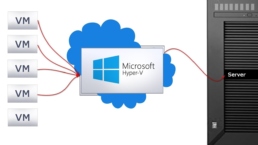To increase the flexibility of deploying applications within the enterprise, virtualization is most effective. Microsoft Hyper-V Server 2012 is a hypervisor-based server virtualization that consolidates workloads, helping organizations improve server utilization and reduce costs. Hyper-V Server is a dedicated, standalone product built on top of the Windows Server Driver Model hypervisor, with virtualization capabilities and support for features such as failover clustering. Hyper-V Server is compact and requires minimal implementation costs. Server Consolidation does not require additional Windows licenses.
 Windows Server 2012 is recommended for organizations looking for a flexible and cost-effective Hyper-V server-based virtualization solution. Virtualization in Windows Server 2012 has some limitations, while Windows Server 2012 Datacenter Edition provides the ability to create an unlimited number of virtual machines.
Windows Server 2012 is recommended for organizations looking for a flexible and cost-effective Hyper-V server-based virtualization solution. Virtualization in Windows Server 2012 has some limitations, while Windows Server 2012 Datacenter Edition provides the ability to create an unlimited number of virtual machines.
One of the most common uses for Hyper-V Server is Virtual Desktop Infrastructure (VDI). VDI allows you to organize a client-server architecture, the client’s operating system will run on server virtual machines in the data center, and the user can access them from a PC, thin client, or another client device. This will centralize user clients and all work will be done in a virtual environment.
By using VDI with Microsoft Hyper-V Server 2012, users will have access to OS and programs running in the data center from any device. Hyper-V Server also provides IT professionals with a cost-effective solution, with a simplified administration architecture, flexible storage options, and dynamic resource allocation.
Key features of Hyper-V
Microsoft Hyper-V Server 2012 provides advanced features and functionality to help you consolidate servers and use resources efficiently.
HYPER-V NETWORK VIRTUALIZATION
Hyper-V Network Virtualization separates server configuration from network configuration to provide multiple virtual private networks. This allows for uninterrupted communication between virtual machines, as well as migration between physical servers, increasing security by isolating networks from each other.
VIRTUAL MACHINES: SCALE AND MOBILITY
Hyper-V Server is a feature of Windows Server OS that can host a large number of virtual machines with multiple virtual processors and memory, with the ability to build server clusters. These enhancements, combined with other features such as dynamic memory, can handle even very heavy loads. Hyper-V Server provides more flexibility in hosting virtual machines and managing the entire virtual environment by enabling support for simultaneous live migration and resource sharing.
Advantages of Hyper-V virtualization
- COST+EFFECTIVENESS
- INCREASING PRODUCTIVITY AND SCALABILITY
- USE OF AVAILABLE SKILLS
If you have a desire to build your IT infrastructure based on Hyper-V technologies, we will help you to realize your idea.

